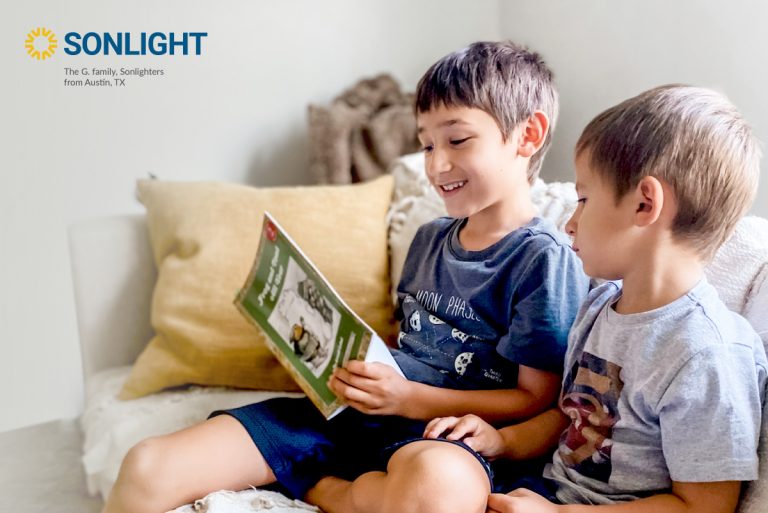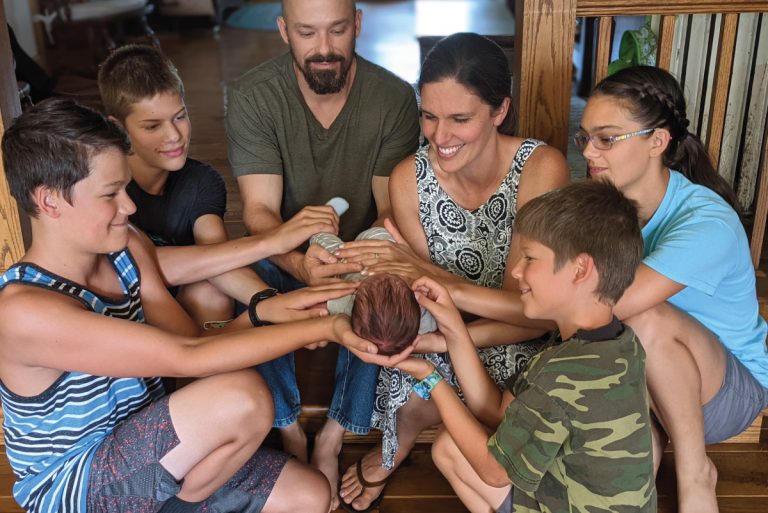Do you or your kids have a little cabin fever? If so, you are definitely not alone. This time of year is often very hard for homeschoolers ... even those who aren't in the middle of a snow-packed winter or a year with a pandemic.
When I was homeschooling, I often appreciated some extra encouragement in the weeks (months?) before spring. So let me encourage you: January will end, and there is light at the end of the tunnel. Sooner or later, spring will come again. I promise!
I was going to offer some practical advice about how to face the winter doldrums in your family and homeschool, but I found that a fellow Sonlight mom Robin E. Williams had already put that advice into words better than my own. She composed these thoughts in 2011 and gave me permission to share them here. The original article has been updated to suit the special circumstances of 2022.
Sooner or later every homeschool mother feels it —a feeling, most commonly in January or February, of burnout, weariness, or despair that comes upon us like a slow fog or sudden storm. I call these feelings the doldrums in reference to the area near the equator known to sailors for both stagnant calms and abrupt squalls.
As the sailors in the days of the great clipper ships had to face the doldrums in order to reach their destinations, so we too must face our own doldrums to reach our goal of a successful homeschool year.
How the doldrums manifest varies from parent to parent and from year to year.
So, what’s a homeschool mom to do when staring into the face of the doldrums?
Realize the Doldrums Are Common
Well, the first thing to do is be aware that you aren’t the only one to ever feel this way. Such feelings, in one form or the other, are common among homeschoolers, especially at this time of year.
You may think it's only the pandemic and the huge shift we've all faced over the last year. Yes, that's a big part of it! But homeschool moms typically feel this friction even in the best of years.
Don’t you for one second believe that all the other moms have it all together, no matter how together they look or sound. Be willing to open up and share your feelings with another homeschooler, and you will find just how common the doldrums are.
What Not To Do
While in the grip of the doldrums is not the time to make drastic changes or decisions concerning your homeschool. It may be the doldrums are the stimulus that sends you searching for new curriculum, but delay
spending money or setting anything in stone until the feelings have passed.
Give yourself time, maybe lots of time, before making any radical decisions so that you can avoid the possibility of serious regret later.
Try a Small Something New
I know I just said not to purchase all new curriculum during this time in your homeschool, but sometimes adding in a single new thing can go a long way toward breathing new life into your school year.
Whoever said you have to begin every subject fresh at the start of August? Maybe you could start a new art curriculum or take a week off of your normal work to do a unit study on a topic of special interest to your
family.
If you are worried your child is behind, take a week off to work through one of the What Your X Grader Needs to Know books, a phonics workbook, or a spelling curriculum.
Do Something Different
Sometimes the best way to get a more realistic picture of your homeschool is to get out of your home. If you haven’t been taking part in a local support group’s field trips or events, maybe now is the time to do so. The pandemic makes outings challenging, and it's easy to stay at home and grouse about our lack of options. Instead pair sunny days with outdoor activities that you can safely enjoy by bundling up in warm clothes. The sunshine will do you a world of good.
Or stay indoors and hold a family science fair. Or start making a bucket list of field trips, festivals, and museums you want to take advantage of once everything opens back fully. Sometimes just dreaming of and planning for fun you can have in the future is enough to put pep back in your step.
Another idea would be to start a new small group; the theme of the group is less important than the getting together. Let me let you in on a couple small group secrets
- If you organize it, they will show up.
- Other people care less about how clean your house is than you think they do.
Simplify
In normal years, I'd suggest that maybe the cause of your doldrums is that there isn’t enough home in your homeschool. It's easy to find yourself tied down and on the go with too many extracurricular activities and homeschool co-ops.
This cutting back on outside commitments has been a silver lining in the pandemic for many families. They've realized that being pulled in all directions was draining instead of enriching.
Of course, right now, we're longing for at least a bit of that helter-skelter dash to get everyone ready, out the door, and across town for an activity. Remember this feeling in 18 months when you're harried and busy. It's okay to say no when you have a plethora of options in front of you.
Don't Assume Homeschooling Is the Culprit
Maybe the problem isn’t your homeschool. Because of the day-in and day-out, intimate nature of homeschooling our children, sometimes problems that would exist whether we homeschooled or not make homeschooling more unbearable. Character issues, in the children or in you, are particularly difficult on your school day. From a habit of laziness to just plain rebellion, the possibilities are diverse.
Addressing character faults isn’t easy, but at least you can comfort yourself that it is work that would need to be done no matter what method of schooling your family used.
Another possible cause of problems that is not related directly to homeschooling is a continually messy or clutter filled home. Taking a week off your studies to focus on household deep cleaning, decluttering, and organizing may be just the ticket.
Seek Positive Help
I purposefully wrote positive help, because the middle of the homeschool doldrums is not the time to confide in a homeschool skeptic friend or relative. It would do more harm to you than good. Rather, seek those you know will give you positive and supportive help. Reach out to your spouse if at all possible, sharing that you need more prayer and understanding than before.
Lastly, I urge you to seek the help our heavenly Father. I mention this last not as an afterthought or because it is least important, but rather because if we remember best what we read last I want this to be what you remember best. He has offered us many precious promises that will sustain you during the trying times of the doldrums, but we have not because we ask not (James 4:2).
We're praying hard here at the Sonlight office for God to sustain and encourage you through 2021. May Robin's words be an encouragement as well. And may you press on toward the long-term hope to which God has called you!
A Guide to Setting Goals and Remembering the Reason You Homeschool — a free gift to you




















